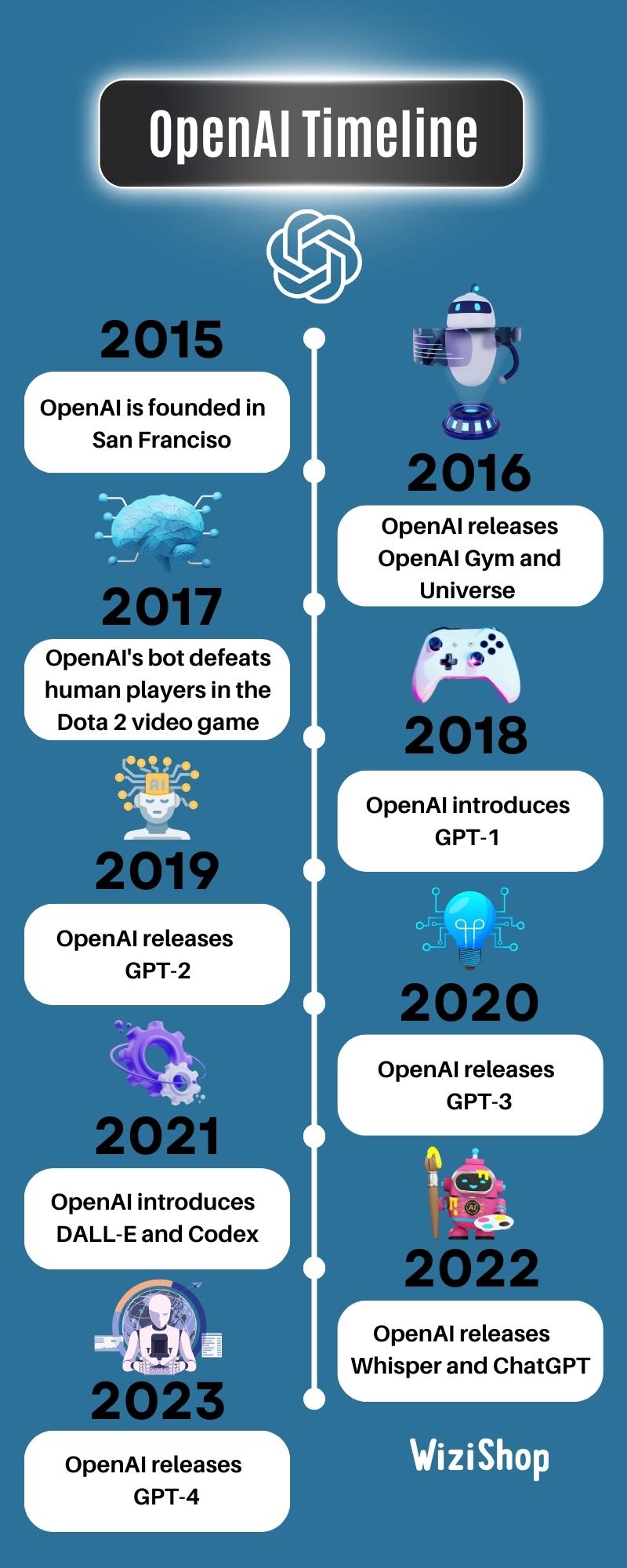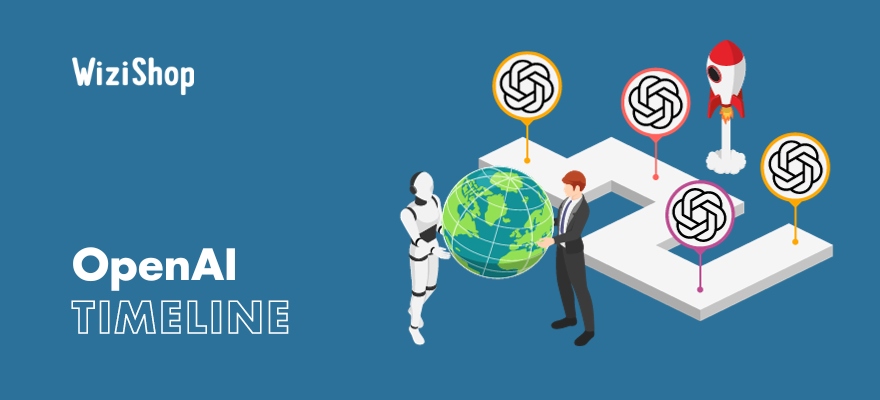OpenAI, a pioneering force in artificial intelligence (AI), has made remarkable strides on a dynamic timeline that mirrors the rapid evolution of the AI landscape.
Founded in December 2015 by Elon Musk, Sam Altman, and others, OpenAI has been committed to advancing AI research, with a vision to ensure that its benefits are accessible to all of humanity. The journey has been characterized by groundbreaking achievements, from the development of the GPT-3 language model, capable of human-like text generation, to advancements in reinforcement learning, robotics, and ethics in AI.
This article explores the chronological narrative of OpenAI's notable achievements and milestones, shedding light on the organization's dedication to pushing the boundaries of AI while maintaining a focus on ethical considerations and responsible AI development.
Read on to learn all about OpenAI's transformative impact on the history of artificial intelligence!
What is the history of OpenAI?

2015: OpenAI is founded in San Francisco
The origins of OpenAI can be traced back to December 2015, when several tech luminaries, including Sam Altman, Greg Brockman, Reid Hoffman, Jessica Livingston, Elon Musk, Peter Thiel, Amazon Web Services (AWS), Infosys, and YC Research, came together and jointly unveiled the launch of OpenAI. Their monumental announcement was accompanied by a commitment exceeding $1 billion to support this endeavor.
Starting out as a non-profit, the organization was created with the mission of ensuring that artificial intelligence evolves in a manner that's beneficial for all humankind.
2016: OpenAI releases OpenAI Gym and Universe
In OpenAI's first year of operation, its potential and mission attracted numerous top-tier AI researchers to the organization. While their salaries were higher than was typical for people who work for a non-profit, they weren't paid as much as researchers working for tech giants like Facebook and Google.
In April 2016, OpenAI unveiled the public beta version of OpenAI Gym, an open-source toolkit and platform designed for developing and comparing reinforcement learning algorithms.
Later that year in December, the organization introduced Universe, a software platform designed to gauge and enhance an AI's general intelligence using a wide array of games, websites, and diverse applications from across the globe.
2017: OpenAI's bot defeats human players in the Dota 2 video game
The year of 2017 was one of continued growth and achievement for OpenAI, with advancements in AI research, gaming, and safety, and a strong commitment to fostering collaboration in the AI field.
OpenAI's bot, known as OpenAI Five, demonstrated remarkable proficiency by defeating professional human players in the complex video game Dota 2. This marked a substantial leap in AI capabilities for strategic and real-time decision-making.
Later, in its final public demonstration in April 2019, OpenAI Five went on to beat OG, the Dota 2 2018 world champions, at a live event. This was the first time an AI tool defeated professional e-sport players on a livestream.
2018: OpenAI introduces GPT-1
In June of 2018, OpenAI introduced a research paper titled "Enhancing Language Comprehension through Generative Pre-Training," presenting the concept of generative pre-trained transformers (GPTs) as well as the organization's first model, Generative Pre-Trained Transformer 1 (GPT-1).
A kind of large language model (LLM), GPT-1 featured a neural network that was inspired by the architecture and functionality of the human brain. It underwent training on massive volumes of human-generated text, exhibiting versatile capabilities like question generation and answering.
Another major event occurring for OpenAI in 2018 involved Elon Musk resigning from his seat on the board. Musk's reasoning for stepping down was that he believed that a potential future conflict of interest could occur because of his being the CEO of Tesla and the company's use of AI to develop self-driving cars. However, another source reported that Musk was worried about OpenAI falling behind other big names in tech like Google and wanted more control over the organization, a proposal that was subsequently refused by the board.
2019: OpenAI releases GPT-2
February of 2019 saw the announcement of GPT-2, the successor to OpenAI's original GPT model. This model, known for its ability to generate coherent and contextually relevant text, was initially considered too powerful to release due to concerns about potential misuse, particularly regarding the writing of fake news. However, OpenAI decided to share it with the research community and the public, highlighting its commitment to responsible AI development, and released the full version of GPT-2 in November.
Also during this year, OpenAI shifted its structure from being a non-profit to a "capped-profit" company, with profits limited to 100 times any investment put into the organization. OpenAI explained that this capped-profit status would enable them to legally attract investments from venture capital funds and also permits the distribution of company stakes to employees.
With this transition, OpenAI allocated ownership shares to its employees and forged a partnership with Microsoft to utilize Microsoft's cloud computing and AI resources, furthering its research and development capabilities. This collaboration with Microsoft came with a significant investment package of $1 billion in funding for the company.
2020: OpenAI releases GPT-3
OpenAI unveiled the highly anticipated GPT-3 language model in May 2020. GPT-3 is a powerful language model that's capable of understanding and generating human-like text across a wide range of applications.
Trained on large sets of data on the internet, GPT-3 was designed to excel in natural language question-answering, but it also possesses the ability to perform tasks like language translation across different languages and generate coherent and spontaneous text.
In June 2020, OpenAI released a versatile API designed to provide access to their latest AI models. This API was intended to enable developers to harness its capabilities for a wide range of English language AI tasks.
2021: OpenAI introduces DALL-E and Codex
Building upon the foundation of GPT-3, OpenAI released DALL-E, an artificial intelligence model designed to generate images from textual descriptions, in January 2021.
The DALL-E model has been used to create artwork, visualize concepts, and even generate images from abstract or fantastical descriptions. DALL-E showcases the potential for AI models to bridge the gap between natural language and visual content, offering applications in creative design, content generation, and more.
Later that year, OpenAI released Codex, a descendant of GPT-3, which underwent specialized training using code from 54 million GitHub repositories. This robust AI powers GitHub Copilot, the code autocompletion tool. In August 2021, a private beta version of its API was released.
However, Codex faced scrutiny due to reported issues, including glitches, design flaws, and security vulnerabilities. There have also been allegations of GitHub Copilot generating copyrighted code without proper attribution or licensing.
OpenAI has declared the discontinuation of support for the Codex API, effective from March 23, 2023.
2022: OpenAI releases Whisper and ChatGPT
In September 2022, OpenAI introduced Whisper, an automatic speech recognition (ASR) system. ASR technology is designed to convert spoken language into written text. Whisper has a wide range of applications for users, from transcription services to voice assistants and more. It can enhance accessibility for individuals with hearing impairments and is fundamental technology for voice-driven applications and services.
The biggest news from OpenAI came later that year, however.
In December 2022, OpenAI garnered extensive media attention for the release of a complimentary preview of ChatGPT. The company reported that this preview collected more than a million signups for ChatGPT within just five days. What's more, citing undisclosed insiders, Reuters reported in December 2022 that OpenAI had set revenue projections at $200 million for 2023 and an ambitious $1 billion for 2024.
ChatGPT is an AI-powered chatbot and language model designed to generate human-like text responses in natural language. It's built upon the GPT-3.5 architecture, a highly advanced model for text generation. ChatGPT is trained to understand and respond to text input, making it a versatile tool for natural language understanding and conversation.
The ChatGPT chatbot offers users a wide range of applications, including answering questions, providing explanations, generating text content, offering recommendations, and simulating conversation with a virtual agent. ChatGPT can be employed in chatbots, customer support, content generation, and various other natural language processing tasks.
2023: OpenAI releases GPT-4
In January 2023, Microsoft made a significant announcement of a new $10 billion investment in OpenAI, scheduled to be spread over several years. There were speculations that Microsoft might have the right to 75% of OpenAI's profits until it recoups its investment and a 49% ownership stake in the company.
Subsequently, in February of that year, Microsoft revealed its plan to integrate AI technology, built on the same foundation as ChatGPT, into various products, including Microsoft Bing, Edge, and Microsoft 365.
March 2023 brought a leadership change for OpenAI, with Reid Hoffman resigning from his board position at OpenAI due to potential conflicts of interest arising from his investments in AI technology companies through Greylock Partners and his role as co-founder of the AI startup Inflection AI. He continued to serve on Microsoft's board, a significant investor in OpenAI.
In the same month, in a highly anticipated move, OpenAI launched GPT-4 in the same month, marking a substantial advancement in AI language models. The API for GPT-4 generated substantial interest, with a waitlist, and became a prominent feature of the ChatGPT Plus service.
Next, in April 2023, OpenAI announced a substantial investment from PwC, with the consulting firm pledging $1 billion to the organization. This partnership included plans to leverage GPT-4 and the Microsoft Azure OpenAI service.
In May 2023, some members of the OpenAI team, including Sam Altman, Greg Brockman, and Ilya Sutskever, published recommendations concerning the governance of superintelligence. They contend that superintelligence could materialize within the next decade, believing that while its arrival would bring about a great increase in prosperity, a proactive approach to the issue is better than a reactive one, in light of the potential for significants risks.
Their proposal involves establishing an international oversight body responsible for regulating AI systems that surpass a certain capability threshold, while advocating against excessive regulation for relatively less advanced AI systems. They also advocate for increased technical safety research concerning superintelligent systems and call for enhanced coordination, suggesting that governments collaborate on a joint initiative.
In August 2023, it was disclosed that OpenAI had completed the acquisition of Global Illumination, a New York-based startup company specializing in utilizing AI to create digital infrastructure and creative tools. The Global Illumination team has previously spearheaded product development at Instagram and Facebook and made substantial contributions to companies such as Google, Pixar, Riot Games, YouTube, and others.
Then, in September 2023, OpenAI announced that it would host its first developer conference in November of that year. Set to take place in San Francisco, the single-day event known as OpenAI DevDay will unite developers from across the globe with the OpenAI team, offering a glimpse of novel tools and fostering the exchange of ideas. Attendees present in person will also have the opportunity to participate in specialized sessions led by OpenAI's technical experts.
OpenAI's future: What will the next chapters in the company's story be?
There's no doubt about it: OpenAI has made extraordinary strides in technology involving artificial intelligence in a relatively short amount of time. Whether you're for or against the growth of AI, it's clear that OpenAI's products have revolutionized how people go about learning, working, and creating, for both business and personal use.
With all the advancements the company has achieved thus far, it's interesting to think about what the team may work on and release next!
Although there are many examples of artificial intelligence that exist today, it's highly conceivable that there will be many more in the years to come.
Many people have wondered if the company is set to introduce GPT-5 soon, based on the speediness of previous models' releases. However, when speaking at an event at the Massachusetts Institute of Technology in April 2023, Sam Altman, the CEO of OpenAI, stated that the company hadn't yet started training the GPT-5-model.
In any case, with continuing safety and privacy concerns about how artificial intelligence works and how it can be used, including AI-powered language models like the ChatGPT chatbot, OpenAI will need to keep security at the forefront of any new developments, if the company aims to maintain its mission of developing AI systems to help all of humanity.










